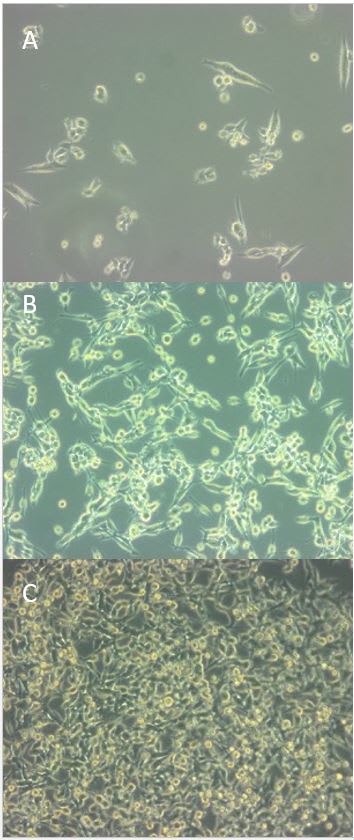MB49 Mouse Bladder Carcinoma Cell Line
Invented at Cancer Research UK London Research Institute: Lincoln's Inn Fields
- Datasheet
- References (21)
- Inventor Info
Info
| Catalogue Number | 153368 |
| Host | Mouse |
| Tissue | Bladder |
| Disease Keywords | urinary bladder neoplasms, bladder carcinoma |
| Model | Tumour line |
| Relevance |
MB49 cell line used as an in vitro and in vivo model of bladder cancer, with enhanced metastatic potential for further migratory investigation. Background and Research Application MB49 cells are a urothelial carcinoma line derived from an adult C57BL/6 mouse by exposure of primary bladder epithelial cell explants to 7,12-dimethylbenz[a]anthracene (DMBA) for 24 hr followed by long-term culture. The syngeneic, murine model of bladder cancer has been widely used for more than 35 years. MB49 cell line was created to demonstrate the effects of ageing on neoplastic transformation in long term primary cultures of the bladder. There is a high age-associated bladder tumour incidence in men. The donor mouse was male, however, a 2012 karyotypic analysis (Fabris et al., 2012. Cancer Genet.) found that the MB49 tumour cell line has lost the Y-chromosome and therefore does not express male-specific antigens. A more recent study evaluated the cell line’s sensitivity to testosterone and the pregnancy hormone, human chorionic gonadotropin (hCG). White-Gilbertson et al., 2016 discovered that MB49 tumour growth was significantly greater in male mice than female mice and that pregnancy did not affect the size or rate MB49 tumour growth in female mice. MB49 cells failed to proliferate in response to hCG in vitro and the functional receptor for gonadotropins was absent. Dihydrotestosterone strongly stimulated growth of MB49 cells in vitro. |
| Conditional | No |
| Research Area | Cancer |
| Recommended Growing Conditions | DMEM, FBS. Note that these cells do not form a 100% confluent monolayer but at 70% confluence tend to detach in small clumps that float in the media. About 10-20% of the cells will be attached with a spindle-like epithelial morphology, the remainder will appear rounded |
| Notes |
Points of Interest The loss of Y chromosome and lack of expression of male specific antigens is a frequent early event within bladder cancer, and thus is an appropriate and effective model system. MB49 cell line displays little to no MHC class I and II molecules but MHC class II antigens are produced when stimulated with interferon. Implanted long term MB49 cells were subcutaneously injected into mice, with the primary tumours resected, mechanically disrupted and trypsin digested to obtain single cells, most of which were adherent but a small population of spheroidal 3D structures in culture. These are likely stem like, basal and highly metastatic, which is ideal for researching metastatic urothelial carcinoma. Immortalisation process: 7,12-dimethylbenz[a]anthracene on day 2 of culture. |
| Cellosaurus ID | CVCL_7076 |
References: 21 entries
Albertó et al. 2019. Oncol Lett. 17(3):3141-3150. PMID: 30867744.
Plote et al. 2019. Oncoimmunology. 8(5):e1577125. PMID: 31069136.
Shi et al. 2019. Onco Targets Ther. 12:4403-4413. PMID: 31239709.
Sex differences in the MB49 syngeneic, murine model of bladder cancer.
Europe PMC ID: 26998503
White-Gilbertson et al. 2016. Bladder (San Franc). 3(1):. PMID: 26998503.
Kasman et al. 2013. J Vis Exp. (82):50181. PMID: 24326612.
An orthotopic bladder cancer model for gene delivery studies.
Europe PMC ID: 24326612
Zhu et al. 2013. BMC Urol. 13:57. PMID: 24188098.
A modified method for isolation of bladder cancer stem cells from a MB49 murine cell line.
Europe PMC ID: 24188098
Fabris et al. 2012. Cancer Genet. 205(4):168-76. PMID: 22559978.
Cytogenetic characterization of the murine bladder cancer model MB49 and the derived invasive line MB49-I.
Europe PMC ID: 22559978
Chen et al. 2009. J Urol. 182(6):2932-7. PMID: 19853870.
MB49 murine urothelial carcinoma: molecular and phenotypic comparison to human cell lines as a model of the direct tumor response to bacillus Calmette-Guerin.
Europe PMC ID: 19853870
Loskog et al. 2005. Lab Anim. 39(4):384-93. PMID: 16197705.
Optimization of the MB49 mouse bladder cancer model for adenoviral gene therapy.
Europe PMC ID: 16197705
Brocks et al. 2005. J Urol. 174(3):1115-8. PMID: 16094076.
Inhibition of tumor implantation by intravesical gemcitabine in a murine model of superficial bladder cancer.
Europe PMC ID: 16094076
Günther et al. 1999. Cancer Res. 59(12):2834-7. PMID: 10383142.
Optimizing syngeneic orthotopic murine bladder cancer (MB49).
Europe PMC ID: 10383142
Summerhayes et al. 1979. J Natl Cancer Inst. 62(4):1017-23. PMID: 107359.
Effects of donor age on neoplastic transformation of adult mouse bladder epithelium in vitro.
Europe PMC ID: 107359
Add a reference
References: 21 entries
Albertó et al. 2019. Oncol Lett. 17(3):3141-3150. PMID: 30867744.
Plote et al. 2019. Oncoimmunology. 8(5):e1577125. PMID: 31069136.
Shi et al. 2019. Onco Targets Ther. 12:4403-4413. PMID: 31239709.
Sex differences in the MB49 syngeneic, murine model of bladder cancer.
White-Gilbertson et al. 2016. Bladder (San Franc). 3(1):. PMID: 26998503.
Kasman et al. 2013. J Vis Exp. (82):50181. PMID: 24326612.
An orthotopic bladder cancer model for gene delivery studies.
Zhu et al. 2013. BMC Urol. 13:57. PMID: 24188098.
A modified method for isolation of bladder cancer stem cells from a MB49 murine cell line.
Fabris et al. 2012. Cancer Genet. 205(4):168-76. PMID: 22559978.
Cytogenetic characterization of the murine bladder cancer model MB49 and the derived invasive line MB49-I.
Chen et al. 2009. J Urol. 182(6):2932-7. PMID: 19853870.
MB49 murine urothelial carcinoma: molecular and phenotypic comparison to human cell lines as a model of the direct tumor response to bacillus Calmette-Guerin.
Loskog et al. 2005. Lab Anim. 39(4):384-93. PMID: 16197705.
Optimization of the MB49 mouse bladder cancer model for adenoviral gene therapy.
Brocks et al. 2005. J Urol. 174(3):1115-8. PMID: 16094076.
Inhibition of tumor implantation by intravesical gemcitabine in a murine model of superficial bladder cancer.
Günther et al. 1999. Cancer Res. 59(12):2834-7. PMID: 10383142.
Optimizing syngeneic orthotopic murine bladder cancer (MB49).
Summerhayes et al. 1979. J Natl Cancer Inst. 62(4):1017-23. PMID: 107359.
Effects of donor age on neoplastic transformation of adult mouse bladder epithelium in vitro.
Add a reference





